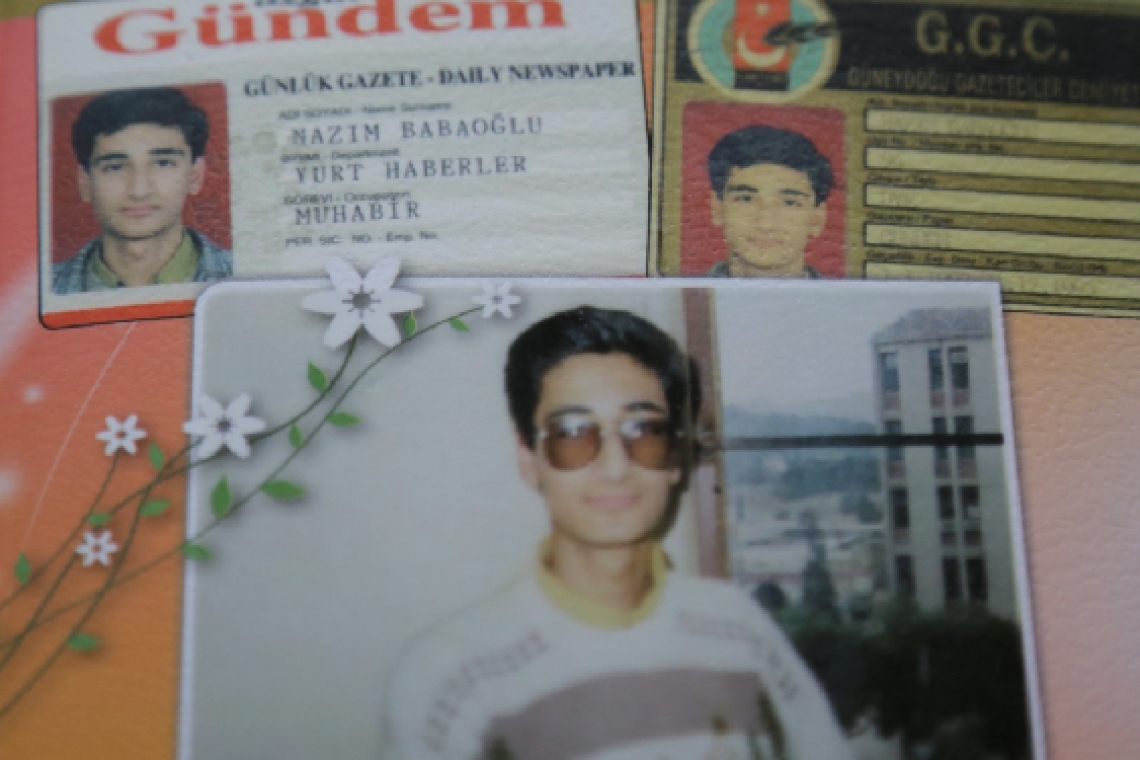Nazım Babaoğlu, a journalist who disappeared on March 12, 1994, in Siverek, Turkey, is at risk of having his case closed due to the 30-year statute of limitations. Lawyer Gülay Koca, representing Babaoğlu's family, expressed concerns that the investigation, left unresolved for 27 years, could be closed due to the expiration of the legal time frame. Cemal Babaoğlu, Nazım's brother, accused the authorities of deliberately delaying the case to run out the statute of limitations.
Babaoğlu, a reporter for Özgür Gündem Newspaper, went missing in Urfa's Siverek district and was never heard from again. He was 19 at the time of his abduction. Efforts by his family, colleagues, and human rights advocates to find him were fruitless. State officials denied detaining Babaoğlu or even his presence in Siverek. However, anonymous witnesses claimed he was forcibly taken away by soldiers and village guards, then brought to the house of village guard chief Sedat Bucak. Nazım’s father, İbrahim Babaoğlu, seeking to learn his son's fate, was reportedly detained and threatened by the police. The case languished on the dusty shelves of the judiciary, with no perpetrators identified. In 2021, the prosecutor’s office, which had taken the case off the shelf, issued a confidentiality order.
The family's application to the Constitutional Court of Turkey, citing a violation of Nazım’s "right to life," was rejected. The Court, based on population registry records, alleged that Nazım was alive despite his family not hearing from him in 29 years. The Court did acknowledge that there was a reasonable timeframe violation in the case.
Cemal Babaoğlu and the family's lawyer, Gülay Koca, spoke about the latest stage of the investigation and the experiences throughout this process.
'This case was deliberately delayed to expire the 30-year limit'
Cemal Babaoğlu revealed that their research, as the family and Özgür Gündem Newspaper, determined Nazım was abducted in front of Siverek's Ulu Mosque. "It was identified by eyewitnesses that he was detained by a group of village guards led by Sergeant Mehmet Kıraç and Gani Kızılkaya. One of the eyewitnesses even went to Diyarbakır Special Prosecutor Ahmet Karaca in 2008 to report what they had seen. However, the prosecutor did not take the necessary steps and the mentioned individuals were not interrogated. The investigation was not conducted properly despite the emergence of witnesses and their statements over these 30 years. The file was deliberately kept pending for the expiration of these 30 years,” he stated.
'Turkey will always be known as a country of disappearances'
Babaoğlu lamented the rejection of their lawsuit seeking to uncover his brother's fate and identify the perpetrators, mentioning the delay in handling their application by the Council of State and Constitutional Court. “The Constitutional Court, which delayed our application for seven years, rejected our individual application, claiming there was no evidence of my brother's enforced disappearance and even suggested he was alive according to population records. It’s been 30 years since my brother was forcibly disappeared. According to Turkish laws, this case could be closed due to the expiration of the 30-year statute of limitations. Our fight for justice doesn’t end until we say it’s over. We lost our brother, but Turkey will always be remembered as a country of disappearances; it will live with this shame," he said.
'Unsolved' case on judicial shelves since 1994
Family lawyer Gülay Koca informed that the Urfa Chief Public Prosecutor's Office shelved the case on October 17, 1994, due to lack of identified perpetrators. She recalled that the Siverek Chief Public Prosecutor's Office, to which the case was sent due to lack of jurisdiction in 2001, returned the file. Koca noted that when they requested information from the prosecutor's office, they were informed that the investigation continued with Nazım being considered dead and efforts to capture unnamed suspects were ongoing. She added that the file was registered under a different basis in 2015.
Unable to access the case file since 2021 due to a confidentiality order
Koca explained that a confidentiality order issued by the Şanlıurfa 1st Criminal Peace Judgeship in 2021 prevented them from examining the case's progress or accessing newly entered documents. Despite appealing against the confidentiality order, they were unsuccessful. "There has been no effective investigation conducted so far, nor have any perpetrators been caught or any progress made in determining Nazım Babaoğlu’s fate," she stated. Koca also mentioned their unsuccessful individual application to the Constitutional Court for violations of fair trial and right to life, and their subsequent application to the European Court of Human Rights. Due to the confidentiality order, they were unable to determine if there were any developments that might interrupt the statute of limitations, which could potentially expire on March 12, 2024, considering the date of the incident.



